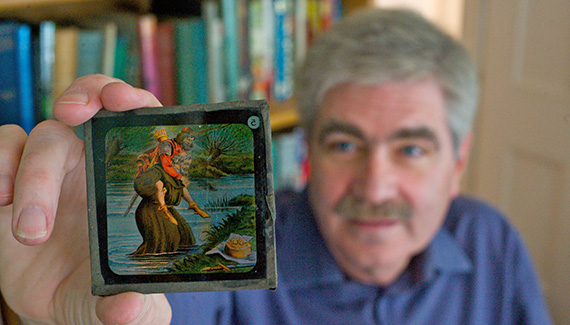|
|
|
|
 (University of Rochester photo / J. Adam Fenster)
Photonic chips could give drones a lift when GPS is unavailableResearchers at Rochester are developing photonic chips that could replace the gyroscopes currently used in aerial vehicles (UAVs) or drones, enabling them to fly where GPS signals are jammed or unavailable. Using a quantum technique called weak value amplification, the scientists aim to provide the same sensitivity level of bulk optical gyroscopes on small, handheld photonic chips, potentially transforming navigation for drones.
“Right now, the sensitivity and stability of a gyroscope must be fundamentally traded off between its size and weight,” says Jaime Cardenas, an associate professor at the Institute of Optics. “As drones, UAVs, and satellites become smaller and more ubiquitous, the need for ultracompact navigation-grade gyroscopes will become critical. State-of-the-art miniaturized gyroscopes are compact and robust but suffer from a performance deficit that hinders their use in navigation.”
Find out more.
Laser Lab supercomputer ranked one of the world’s most powerful
(University of Rochester photo / J. Adam Fenster)
The University’s Laboratory for Laser Energetics (LLE) is one of only several facilities in the world where scientists are studying laser-driven inertial confinement fusion (ICF) for national security purposes and to harvest energy from nuclear fusion. Fusion, which powers the sun, has long been a component of maintaining the nuclear deterrent and is viewed as an ideal potential energy-production mechanism.
The new supercomputer enables a four-fold increase in high-performance computing to simulate high-energy-density physics and inertial confinement fusion experiments.
“A new supercomputer housed at the University will make it possible for researchers to simulate complex high-energy-density phenomena in ICF in three dimensions with unprecedented details,” says Valeri Goncharov, Theory Division Director and a distinguished scientist at LLE.
Projects that might have taken 30 weeks to run on earlier systems can be completed in a matter of a few days using the supercomputer, called “Conesus” after one of the Finger Lakes.
Watch a video to learn more.
Paper explores real estate market during COVID-19
(Getty Images)
Real estate is responsible for one quarter of the world’s wealth, but it is studied in far less depth than other asset classes. Alex Priest, an assistant professor at the Simon Business School, is a coauthor of a recent paper in the Journal of Finance that begins to fill in those gaps.
“We looked at nearly 40,000 commercial mortgage-backed securities (CMBS) loans that were underwritten from 2013 to 2019 and found a tremendous amount of variation in the quality of loan underwriting,” says Priest in an interview.
Get the whole story.
Grant supports Middle English text initiative
(University of Rochester photo / J. Adam Fenster)
Thomas Hahn, a professor of English, has received a $299,748 grant from the National Endowment for the Humanities to continue work on Rochester’s pioneering Middle English Text Series (METS) of scholarly editions and translations. The new project entails preparing six volumes of Medieval literary texts, ranging from the 13th to the 15th century, for print and digital publication, and a redesign of the digital interface for METS.
Hahn’s research focuses on the sponsorship, production, and interpretation of texts and images from the earlier Middle Ages through the early modern period. His scholarship, teaching, and mentorship in the field of medieval studies were honored with a Festschrift published in 2022 titled Negotiating Boundaries in Medieval Literature and Culture and a conference earlier this year celebrating his 50-year tenure at Rochester.
Learn more about METS.
NIH-CSR’s initiatives to strengthen peer reviewMonday, October 23, 10:30 a.m.–noon
Class of ’62 Auditorium, 601 Elmwood Ave.
The Office of the Vice President for Research is excited to announce that Noni Byrnes, director of the Center for Scientific Review (CSR) at the National Institutes of Health (NIH), will share her expertise in the NIH peer-review process. If you are unable to attend in person, the seminar will also be livestreamed. If you attend in person, there is no need to register. If you plan to attend via Zoom, please register.
SMD GEPA Philosophy Meeting and Awards CeremonyMonday, October 30, 3–6 p.m.
Sarah Flaum Atrium, 415 Elmwood Ave.
This ceremony celebrates the achievements of School of Medicine and Dentistry graduate students, postdocs, faculty, and staff. A reception will follow. Register to attend.
UNYTE Virtual Scientific Session: Advancing translational science in rural health researchWednesday, November 1, 9–11 a.m. EDT
Virtual
Researchers from across New York State will explore innovative strategies for overcoming barriers to the participation of rural populations in health research. The event features a keynote presentation by Xinzhi Zhang, Chief of Health Inequities and Global Health Branch at the Center for Translational Research and Implementation Science at the National Heart, Lung, and Blood Institute. See the full agenda and register.
28th Annual Wilmot Cancer Institute Scientific SymposiumThursday, November 2, 7:45 a.m.–4:15 p.m.
Class of ’62 Auditorium, 601 Elmwood Ave.
The symposium brings together scientists working in basic, translational, and clinical cancer research, to share exciting findings, new projects, and success stories. The 2023 event will feature keynote speaker Ned Sharpless, former director of the National Cancer Institute and a professor of medicine at the UNC Lineberger Comprehensive Cancer Center. Sharpless was appointed acting director of the US Food and Drug Administration in 2019 and served as director of the National Cancer Institute from 2017 to 2022. The program will also include a presentation of the annual Davey Award, plenary talks by Wilmot members, trainee research presentations, and a scientific poster competition. Learn more and register to attend.
Data Bloom: Composing stories in TableauTuesday, November 7, 1–2:30 p.m.
Carlson 103
In this hands-on River Campus Libraries workshop, you’ll dive into the world of data visualization using Tableau, a powerful and user-friendly tool that allows you to effortlessly connect to various data sources, explore your data, and craft stunning visual representations. No prior experience with Tableau is required. See the requirements and register.
Planning grants to support transdisciplinary research centers and institutesApply by Wednesday, January 31
As part of the University’s strategic plan, Boundless Possibility, the Office of the Provost will establish a set of new and reimagined transdisciplinary centers and institutes. As a first step, the University will fund one-year planning grants of $20,000 to $40,000 to allow colleagues to develop and refine proposals that could lead to the establishment of these new centers and institutes.
Faculty are invited to apply for a grant and help shape the future of interdisciplinary research at Rochester. Explore the key RFP details and complete the grant submission form.
|
|
|
|
|